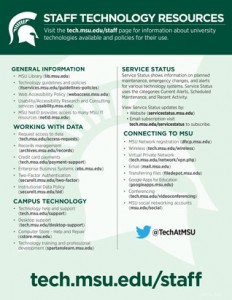MSU NetID & ID card
MSU NetIDs are assigned to all current faculty, staff, students, and retirees. The NetID personal identifier is a unique alphanumeric identifier auto-generated from the user’s name and serves as the login to many university computing and networking services.
The MSU ID Office also provides support for a wide variety of services tied to Spartan Cards, including electronic access control to buildings and parking gates and MSU Library services. Stop by the MSU ID Office to get your card.
Getting connected
Learn about Getting Online and Connected to the MSU Network, including using the Virtual Private Network (VPN).
Michigan State University safeguards personal and institutional data by applying two-factor authentication.
To access enterprise business systems, employees need to register two-factor authentication credentials. To ensure you have access to your information at all times, it is important to register two devices.
Desktop support
MSU IT offers desktop support as a service (including desktop computers, laptops, mobile devices, and tablets) to academic and administrative units. We partner with each unit to find the right level of support based on your environment and needs.
Also check out the MSU Virtual Desktop service as an option for accessing licensed enterprise software.
Technology purchases
MSU is committed to providing an accessible, usable, and integrated user experience. When purchasing Electronic Information Technology (EIT), units should understand the impact these purchases have on individuals with disabilities inside and outside the university. MSU Purchasing is facilitating web accessibility and security reviews as part of the purchasing process for both new EIT products and renewals.
Website services
MSU supports several different website services including:
- Cascade Server (Web Content Management System)
- MSU SSL Certificates (Secure Web Encryption and Authentication):
- Web Hosting (Web Server Options)
- Domain Name Guidelines
- Web Design and Development Contracts
Accessibility
MSU IT is committed to providing technological services to the MSU community that are accessible and barrier-free. There are numerous resources available to students, including:
Technology services
Various technology services are available to the MSU community including:
- Collaborative tools like email and, Spartan 365
- Storage options for files, media, and departments
- Department hardware and software, including campus site licenses
- Survey tool as part of Qualtrics enterprise license
- Conferencing resources like Zoom
- Video production to consult, scope, and produce video
- Data management solutions to help manage and analyze data
- Application development and integration to build and integrate vended products with MSU systems
SecureIT safe computing tips
SecureIT offers information and tips for keeping your personal information and computer safe. It also provides information about securing institutional data.
Institutional data
- Store confidential data on a secured server and connect to the server if you need to access that data.
Read the MSU Institutional Data Policy. - Avoid storing multiple copies of confidential data and lock your computer when leaving it unattended.
Know the best practices for securing institutional data. - Avoid sending confidential data by email.
Understand how to handle institutional and confidential data.
Also, check out the Employee Guide and Administrator Supervisor Guide.
Passwords & phishing
- Create strong passwords and don’t share them with anyone, including your parents.
Learn more about strong passwords. - Don’t respond to emails asking for your password and NetID or account information.
Learn more about what to look for in a phishing email. - Report phishing attempts to alert MSU to potential widespread phishing.
Learn more about reporting email phishing or computer system and network abuse to MSU.
Access requests
MSU employees currently gain access to certain systems and applications through an access request process coordinated by MSU Information Technology. Access requests to a variety of information systems, mainframe data files, and reporting databases are granted by either an access request or hard copy access request memorandum (ARM).



